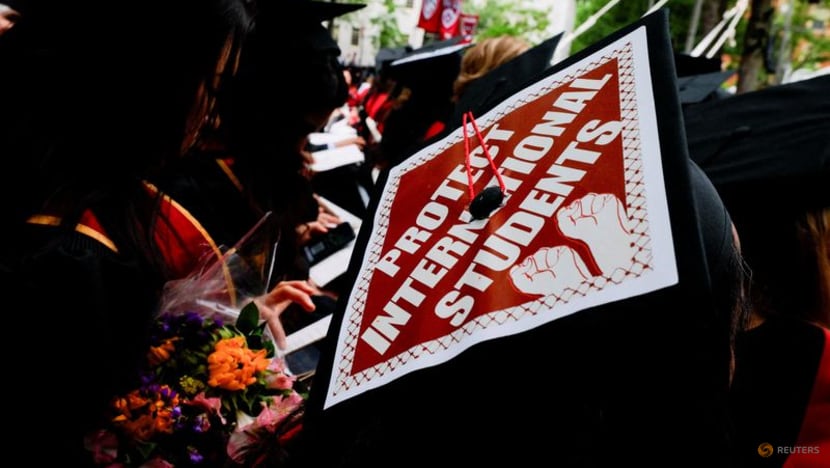Beijing accuses US of holding Chinese students in ‘small, dark rooms’ for over 70 hours
A spokesperson for the Chinese foreign ministry hit out at what she described as the "discriminatory and politically motivated" treatment of Chinese nationals arriving at the border.

A US border patrol officer. (File photo: Getty Images/John Moore via AFP)

This audio is generated by an AI tool.
Beijing has lashed out at the United States for questioning Chinese students at the border, accusing it of discrimination and of taking them into “small, dark rooms” for over 70 hours.
Mao Ning, a spokeswoman for the foreign ministry, said on Friday (Aug 22) that these actions “seriously infringed upon the legitimate and legal rights and interests of Chinese citizens, severely obstructed normal personnel exchanges between the two countries, and seriously undermined the atmosphere for people-to-people and cultural exchanges”.
She told a scheduled press conference: “Recently, the US has frequently engaged in discriminatory, politically motivated and selective law enforcement against Chinese students travelling to the US.
“These students are subjected to unfair treatment, including being taken into small, dark rooms for repeated and prolonged interrogations,” she said, speaking colloquially about the interrogation facilities.
“Some have been detained for over 70 hours and questioned about topics completely unrelated to their purpose for travelling to the US. In some cases, their visas are cancelled and they are denied entry, citing so-called national security concerns.”
Mao said China had lodged immediate representations after each incident and urged Washington to “thoroughly investigate and correct its mistakes”.
“We urge the US to face this issue directly, take China’s concerns seriously and implement the statements made by US leaders welcoming Chinese students to study in the US,” she added.
Beijing has repeatedly expressed strong dissatisfaction about the treatment of Chinese students.
In January last year, the foreign ministry accused the US of “politicising and weaponising academic research, and abusing the concept of national security to heavily suppress and persecute Chinese students” despite its claims to champion academic freedom.
More than 5,000 Chinese students and scholars were denied visas or deported by the US between 2021 and March 2024, according to an estimate by state-run China News Service.
In 2021 alone, the US denied visas to at least 2,000 Chinese students studying science, technology, engineering and mathematics, the foreign ministry said two years ago.
Since the start of President Donald Trump’s second term in office, Chinese students in the US have faced further uncertainty.
In May, Secretary of State Marco Rubio vowed to “enhance scrutiny” of applications from mainland China and Hong Kong.
“Under President (Donald) Trump’s leadership, the US State Department will work with the Department of Homeland Security to aggressively revoke visas for Chinese students, including those with connections to the Chinese Communist Party or studying in critical fields,” he said.

This week the State Department said that more than 6,000 foreign students had their visas revoked since Trump took office.
It also announced it was vetting more than 55 million US visa holders for deportable offences, including overstays, criminal activity and engagement in any form of “terrorist activity”.
Trump’s first term also saw Chinese students being hit with visa restrictions. In 2018, Chinese nationals involved in hi-tech fields such as robotics and aviation were told they would only be issued one-year visas rather than the standard five-year version.
This article was first published on SCMP.


















